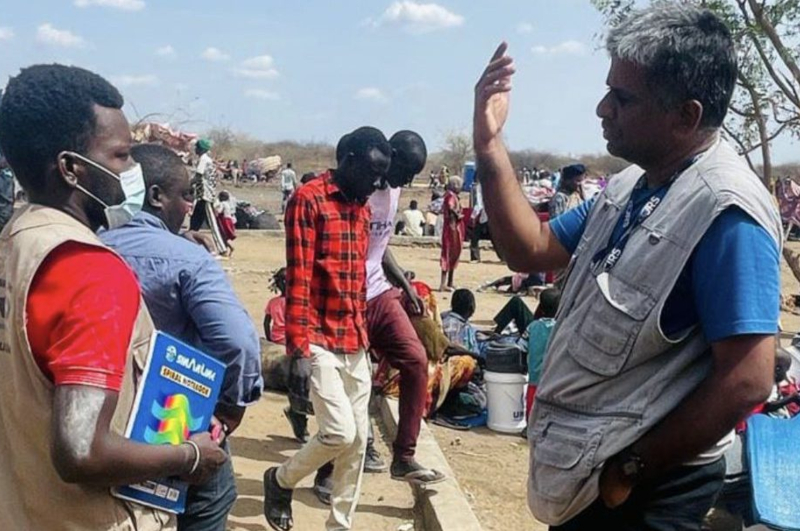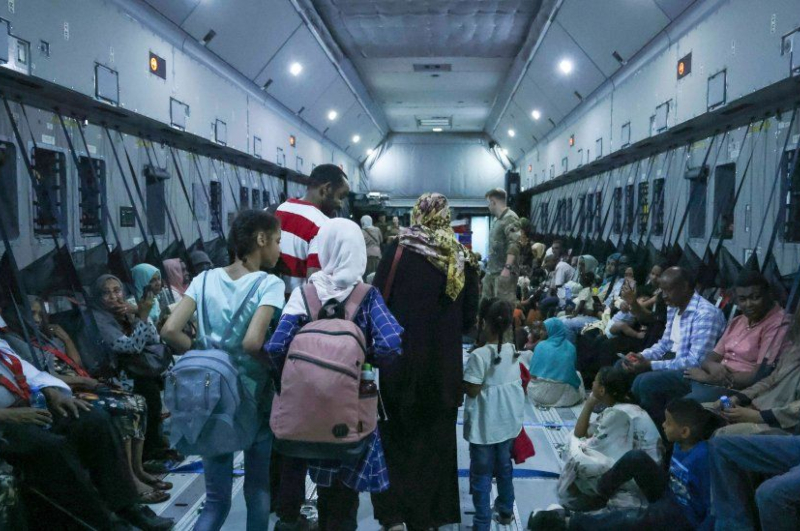




One year ago, the city of Khartoum erupted in violence, capturing global attention. Since then, the conflict has expanded across Sudan, affecting almost every region.
The war has resulted in numerous deaths and mass displacements, bringing prolonged suffering and hopelessness to countless individuals. As the world seemingly grows accustomed to the violence, the daily toll of lives lost and people displaced has faded from the forefront of international concern. Meanwhile, the warring factions persist in their struggle for dominance, apparently indifferent to the widespread anguish their actions have caused.
Influx of Refugees Overwhelms Renk
This month saw a significant influx of refugees and returnees from Sudan, arriving in vehicles of all types, including cars, tractors, and farm machinery. In less than a week, the two reception centers in Renk became overwhelmed, forcing many to set up makeshift shelters outside the compounds and in a nearby school. This surge was triggered by renewed clashes between the Rapid Support Forces (RSF) and government troops in Sinjah and Sennar towns, with the conflict spreading towards Rabak and Kosti. These towns are situated roughly 250 kilometers from Renk, the first town in South Sudan from the Joda border point.
Overcrowded Transit Centers and Scarce Resources
The transit centers in Renk, designed to accommodate 5,000 people, have been severely overcrowded for some time, housing around 12,000 individuals. On July 5th, over 4,000 more refugees crossed the border, many unregistered as they traveled using personal vehicles and various routes. There has been no relocation of refugees to the camps in Maban or Malakal, exacerbating the strain on already limited services. Most budgets for these centers are allocated for a transit period of no more than three days, adding to the challenges faced by the partners involved.
Rising Prices and Scarcity of Commodities
The surge in population has led to increased demand for goods, causing commodity prices to skyrocket fivefold. This scarcity persists even for those with money to spend. The situation is particularly dire for the newly arrived refugees, many of whom are large-scale farmers who previously supplied Renk with agricultural products.
The Onset of the Rainy Season
As the rainy season begins, refugees fleeing the conflict now face a new set of devastating challenges. Many are without adequate shelter, exposed to the elements, and surrounded by mud and dirty water. The situation in Renk continues to deteriorate as more refugees and returnees arrive, despite the lack of sufficient facilities and services. The only hope for many lies in resettlement to the Maban refugee camps, which will soon become inaccessible due to the rains.
A Plea for Peace
As the crisis deepens, there is an urgent need for peace in Sudan and the surrounding region. The ongoing conflict not only devastates the lives of those directly affected but also disrupts communities and economies. The world must not forget the plight of these individuals, and efforts must be redoubled to bring about a peaceful resolution to the conflict.
In this photo is Akeera who fled Sudan with her daughter, who needed specialised medical care due to her mobility impairment. In Renk, Akeera's child greatly improved her mobility thanks to the physiotherapy treatment she received. Cases like that of Akeera and her daughter are not unique. Many families in Renk have similar needs.
Help the Jesuit Refugee Service continue to support people fleeing violence in Sudan. To donate click {HERE}
Select Payment Method
Pay by bank transfer
If you wish to make a donation by direct bank transfer please contact Fr Paul Hamill SJ treasurer@jesuits.africa. Fr Paul will get in touch with you about the best method of transfer for you and share account details with you. Donations can be one-off gifts or of any frequency; for example, you might wish to become a regular monthly donor of small amounts; that sort of reliable income can allow for very welcome forward planning in the development of the Society’s works in Africa and Madagascar.
Often it is easier to send a donation to an office within your own country and Fr Paul can advise on how that might be done. In some countries this kind of giving can also be recognised for tax relief and the necessary receipts will be issued.



